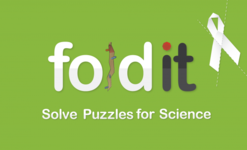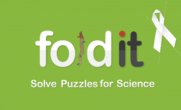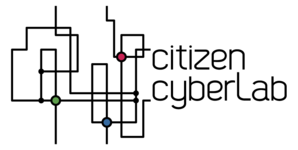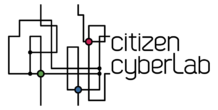Fold It
Cs Portal > List of citizen science projects > Fold It - (2013/12/20)
IDENTIFICATION
- Beta start date : 2008/12/12
- End date : Still open.
- Natural sciences > Biochemistry (biology/medicine/neuroscience)
- Others in the same subject areas: Air Quality with Biomarkers, Andromeda Project, Bat detective, Budburst... further results
- Others projects about biology/medicine/neuroscience: Cell Slider, Eterna, EyeWire, Worm Watch Lab
⇳ Description Fold It is a computer game enabling volonteers to contribute to biochemistry research by resolving proteins puzzles. The game is part of an experimental research project, and is developed by the University of Washington's Center for Game Science in collaboration with the UW Department of Biochemistry. ➠ Purpose Identify the structural configuration of natural proteins to study and understand proteins better. ? Research question "As described above, knowing the structure of a protein is key to understanding how it works and to targeting it with drugs. A small protein can consist of 100 amino acids, [[Has research question::while some human proteins can be huge (1000 amino acids). The number of different ways even a small protein can fold is astronomical because there are so many degrees of freedom." from official project website]]
TEAM
University of Washington
Project team page http://fold.it/portal/info/credits Leader: David Baker Institution: University of Washington's Center for Game Science Partner institutions: UW Department of Biochemistry, UW Center for Game Science, UW Department of Computer Science and Engineering Contact: Not explicitely listed http://fold.it/portal/feedback or https://twitter.com/foldit
USER TASKS
CONTRIBUTION TYPE: data analysis
PARTICIPATION TYPOLOGY: distributed intelligence
GAMING GENRE Puzzle
GAMING ELEMENTS: NONE
◉ Tasks description
⤯ Interaction with objects
▣ Interface
- Data type to manipulate: 3D manipulation
- interface enjoyment: somewhat cool/attractive
- Interface usability:
GUIDANCE
- Tutorial: ✓
- Peer to peer guidance: ✓
- Training sequence: Somewhat
- Individual performance: ✓
- Collective performance: ✓
- Research progress: Somewhat
❂ Feedback and guidance description
COMMUNITY
- Main news site: http://fold.it/portal/blog
- Frequency of project news updates: weekly
- Type of events: other
- Frequency of events : 5
⏣ Community description
- Community size (volounteers based) 6398
- Role:
- Interaction form: Blog Comments and Twitter
- Has official community manager(s): maybe
- Has team work yes
- Other: Forum fairly active.
- Community led additions:
Other information
PROJECT
Url:http://fold.it/portal/
Start date: 2008/05/08
End date: Still open
TEAM
Official team page:http://fold.it/portal/info/credits
Leader: David Baker
Institution: University of Washington's Center for Game Science
Partner institutions: UW Department of Biochemistry, UW Center for Game Science, UW Department of Computer Science and Engineering
Contact: http://fold.it/portal/feedback or https://twitter.com/foldit
Main location: University of Washington
PROJECT DEFINITION
Subject
Natural sciences > Biochemistry (biology/medicine/neuroscience)
Description
Fold It is a computer game enabling volonteers to contribute to biochemistry research by resolving proteins puzzles. The game is part of an experimental research project, and is developed by the University of Washington's Center for Game Science in collaboration with the UW Department of Biochemistry.
Purpose.
Identify the structural configuration of natural proteins to study and understand proteins better.
Research question.
"As described above, knowing the structure of a protein is key to understanding how it works and to targeting it with drugs. A small protein can consist of 100 amino acids, while some human proteins can be huge (1000 amino acids). The number of different ways even a small protein can fold is astronomical because there are so many degrees of freedom." from official project website
ABOUT PARTICIPANT TASKS
.
.
| Grey typology | Participation typology | Contribution type: | ||||||||||||||||||||||||||||
|---|---|---|---|---|---|---|---|---|---|---|---|---|---|---|---|---|---|---|---|---|---|---|---|---|---|---|---|---|---|---|
|
|
|
||||||||||||||||||||||||||||
| Gaming | ||||||||||||||||||||||||||||||
| Genre: puzzle | Gaming elements: achievements, score boards, challenges | |||||||||||||||||||||||||||||
| Interface | ||||||||||||||||||||||||||||||
| Data type to manipulate: 3D manipulation | interface enjoyment: somewhat cool/attractive Interface usability: |
Member profiles::minimal Member profile elements: photo, personal interests, badges, activity metrics, other |
||||||||||||||||||||||||||||
ABOUT GUIDANCE AND FEEDBACK
| Guidance | Feedback on | ||||||||||||
|---|---|---|---|---|---|---|---|---|---|---|---|---|---|
|
|
.
COMMUNITY
| Tools | News & Events |
|---|---|
|
Communication: website, blog, forum, wiki, other |
Main news site: http://fold.it/portal/blog |
| Community description | |
|
Community size (volounteers based): 6398 |
|
Other information about community: Forum fairly active.
Community led additions:
OTHER PROJECT INFORMATION
Foldit main.png Yes [[has completion level::Medium]
http://fold.it/portal/info/credits Not explicitely listed University of Washington http://fold.it/portal/feedback or https://twitter.com/foldit 2008/12/12 Yes Biochemistry Natural sciences biology/medicine/neuroscience Identify the structural configuration of natural proteins to study and understand proteins better. "As described above, knowing the structure of a protein is key to understanding how it works and to targeting it with drugs. A small protein can consist of 100 amino acids, [[Has research question::while some human proteins can be huge (1000 amino acids). The number of different ways even a small protein can fold is astronomical because there are so many degrees of freedom." from official project website]] International Fold It
data analysis
distributed intelligence 3D manipulation, other: Thinking: no Computing: no Sensing: no Gaming: yes achievements, score boards, challenges puzzle
somewhat cool/attractive
yes yes strong yes yes somewhat
minimal photo, personal interests, badges, activity metrics, other maybe website, blog, forum, wiki, other Twitter, Facebook other 5 http://fold.it/portal/blog 6398 weekly Forum fairly active.
Blog Comments and Twitter yes Twitter and mentions in popular science articles
Medium
...
Bibliography
| BIBLIOGRAPHY |



